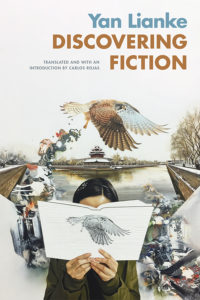
Over the past twenty years, Chinese novelist Yan Lianke has emerged as one of the most important writers in the world. In DISCOVERING FICTION, Yan offers insights into his views on literature and realism, the major works that inspired him, and his theories of writing. He juxtaposes discussions of the high realism of Leo Tolstoy and Lu Xun against Franz Kafka’s modernism and Gabriel García Márquez’s magical realism, charting the relationship between causality, truth, and modes of realism. He also discusses his approach to realism, which he terms “mythorealism”—a way of capturing the world’s underlying truth by relying on the allegories, myths, legends, and dreamscapes that emerge from daily life. Revealing and instructive, Discovering Fiction gives readers an unprecedented look into the mind and art of a literary giant. A literary manifesto that is also an act of faith in humanity’s ability to survive the madness of the world.
‘Everyone complains that we don’t have any great authors and literary works that could do justice to our contemporary era, [but] this ignores the fact that for a long time our literature has sought merely to describe reality, rather than to actively explore it,” writes novelist Yan (The Four Books) in this savvy work of criticism ‘Discovering Fiction’. Focusing on Western and Chinese literature, Yan argues that fiction deals in four different “levels of truth.” There’s “societally structured truth,” which “develops primarily in centralized states and under strong ideological systems”; “worldly experienced truth” based on shared experience (Margaret Mitchell and William Somerset Maugham are a couple notable practitioners); “life-experienced truth,” which allows authors to “analyze the depth of their corresponding era,” as seen in, for instance, Anna Karenina; and “spiritual-depth truth,” the most sophisticated and, Yan argues, “deepest form of reality”—accomplished by Dostoyevsky. Yan then turns to contemporary literature’s use of “mythorealism,” which “rejects the superficial logical relations that exist in real life to explore a kind of invisible and ‘nonexistent’ truth.” While some readers might find Yan’s categories overly simplistic, his framework is precise and well articulated. The result is a thought-provoking look at the state of literature, and how it came to pass.’ Publisher’s Weekly
‘Yan Lianke is among the most innovative polemical fiction writers in contemporary Chinese and world literature. In Discovering Fiction, he demonstrates another facet of his talent: we see Yan as a sharp critic of fiction’s diabolic potential, a bold explorer beyond the boundaries of imagination and a zealous advocate of a world that is both surreal and hyperreal.’ David Der-wei Wang, author of Why Fiction Matters in Contemporary China
‘Discovering Fiction gathers and illuminates Yan Lianke’s views and conceptions of literature. This rich volume also sheds light on Yan’s own masterpieces, such as Lenin’s Kisses and Dream of Ding Village. It’s the kind of literary criticism that is both useful and edifying.’ Ha Jin, author of Nanjing Requiem
‘Yan is one of those rare geniuses who finds in the peculiar absurdities of his own culture the absurdities that infect all cultures.’ The Washington Post
‘Yan’s subject is China, but he has condensed the human forces driving today’s global upheavals into a bracing, universal vision.’ New York Times
‘One of China’s most important—and certainly most fearless—living writers.’ Kirkus Reviews
Sales
- Nankai University Press China
- INK Taiwan
- Editions Philippe Picquier
- Bokforlaget Wanzhi Sweden
- Duke University Press World English
- Takween Arabic Language
- Ketebe Turkey